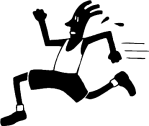A bottle of sugary (non-diet) soda contains about 250 calories. That’s a lot. Reminding yourself of this fact can give you the extra motivation to pass up the soda and go for a drink of water instead. Researchers at the Johns Hopkins Bloomberg School of Public Health think they have found an even better motivation: exercise cost.
To test their theory, they created a sign with the words “Did you know that working off a bottle of soda or fruit juice takes about 50 minutes of running” and posted it in a corner store frequented by thirsty adolescents. The presence of the sign reduced the odds that an adolescent would purchase a sugar-sweetened drink by about 50%. This worked even better than their sign that said “Did you know that a bottle of soda or fruit juice has about 250 calories?” If it works for thirsty teenagers, maybe it’s worth a try!
You can read more about the exercise cost of calories study on the school’s web site.
Relevance to Natural Weight Loss: ![]()
Weight Loss Tip: When you are tempted by junk food, think about how much exercise it would take to work off the extra calories. If it seems worth the cost, commit to doing the exercise before taking the first bite.



